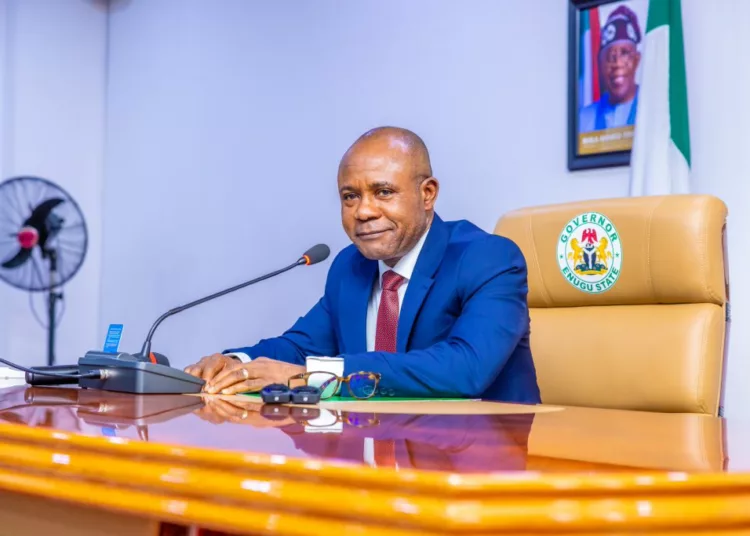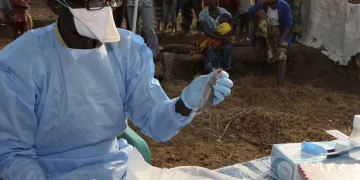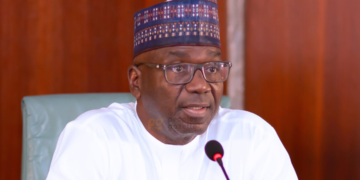The governor of Enugu State, Dr Peter Mbah, has declared that coal deposits in the state will be used to generate 1,000MW of power and will not be treated as a stranded asset without adequate compensation.
Mbah explained that coal deposits in the state have about 0.5 sulphuric content, saying he was counting on technology to minimise the impact of coal use on the environment.
Mbah made these declarations on Thursday in Lagos when he was the guest of the Nigerian-British Chamber of Commerce (NBCC) “Meet The Governor Series,” where he presented a business case for investing in Enugu State.
He said, “We cannot treat our coal, particularly the premium Enugu coal, as a stranded asset.
“Our target is to see how we can use coal to generate at least 1000 megawatts of power. Today, technology makes coal utilisation less adverse to the environment. Essentially, that is the direction for us.
“Coal deposits in Enugu have less than 0.5 per cent sulphur content. For a lot of coal, you are still okay if you have 1.0 per cent. But we have 0.5 per cent.
“Our coal is also splendid for fire power plants due to its high calorific value. So, we are on that and will not warehouse our coal resources.
“However, if we have to warehouse or treat coal as a stranded asset, there must be a conversation on compensation.”
Mbah also said that his administration had cut the crime rate in the state by 80 per cent and was putting infrastructure in place to attract three million visitors per year.
“Businesses are not designed to absorb security challenges. So, we have to get that out of the way. That is why we invested heavily in security to build infrastructures that will enable us to defeat criminal activities.
“Today, in Enugu, we have reduced the crime rate by over 80 per cent,” he said.
Mba revealed that in furtherance of tourism’s contribution to the state’s economy, he completed the Enugu International Conference Centre, ICC, which hosted 20,000 participants during the 2025 Nigerian Bar Association’s Annual General Conference. The ICC 5-Star Hotel was nearing completion and would be delivered soon.
“Enugu naturally lends itself to tourism. We are building the Cross of Hope, which we want to put in place to attract religious tourism.
“The highest point in Enugu State is about 580 metres above sea level, and we are bringing a massive cross of about 100 metres to put on its highest point.
“We plan to bring in three million visitors, so we worked with an investor to get the Akanu Ibiam International Airport construction underway.
“Hopefully, the international wing of the airport will be operational by the first quarter of 2026. We are also investing in building the cargo terminal.
“We are considering bringing in an additional six aircraft for Enugu Air for the Christmas season. We will expand very quickly because we have surpassed our projections within one month of operation,” he said.
The governor added that the state would have four branded hotels by the end of next year. “If you expect three million visitors, hotels will be in huge demand,” he said.
In his welcome address, the president of NBCC, Mr Abimbola Olashore, said that the “Meet The Governor Series” timing could not have been more fitting because Enugu had become a state on the move under Mbah’s administration.
“We have seen bold steps in digital governance, infrastructure expansion, and creative public-private partnerships.
“Each of these signals a state that is not waiting for the future, but actively shaping it.”
Meanwhile, the British Deputy High Commissioner, Mr Jonny Baxter, said the United Kingdom (UK) and Nigeria share a dynamic, long-standing and multi-dimensional trade relationship valued at £7.9 billion, the highest figure since records began and which continues to increase yearly.
Baxter added that the United Kingdom is currently the biggest investor in Nigeria, accounting for about 65 per cent of all foreign direct investment (FDI) flows into Nigeria. He described it as demonstrating the depth of commitment based on historic ties.
“Nigeria is also the United Kingdom’s second-largest trading partner in Africa and its largest export market, and in February 2024, we signed something called the Enhanced Trade and Investment Partnership, which is about trying to make trade smoother between our two countries.
“It is the first of its kind that we have signed with an African country, and in fact, it is the second globally, the first being with India, and you have seen where the trade relationship between the United Kingdom and India has gone. So, we certainly hope for the same trajectory between us and Nigeria.”
Baxter also said that the UK’s “Developing Countries Trading Scheme” would enable over 90 per cent of Nigeria’s exports to the UK to be duty-free.
“All the normal taxes are taken off those items exported from here and imported into the UK. But one of the key obstacles is often standards,” he said, adding that the UK was working with Nigerian standards authorities to help Nigerian companies raise the standards, “because once you are meeting British standards, you are meeting European standards, you are meeting American standards, you have got a much bigger market to export to,” he concluded.





